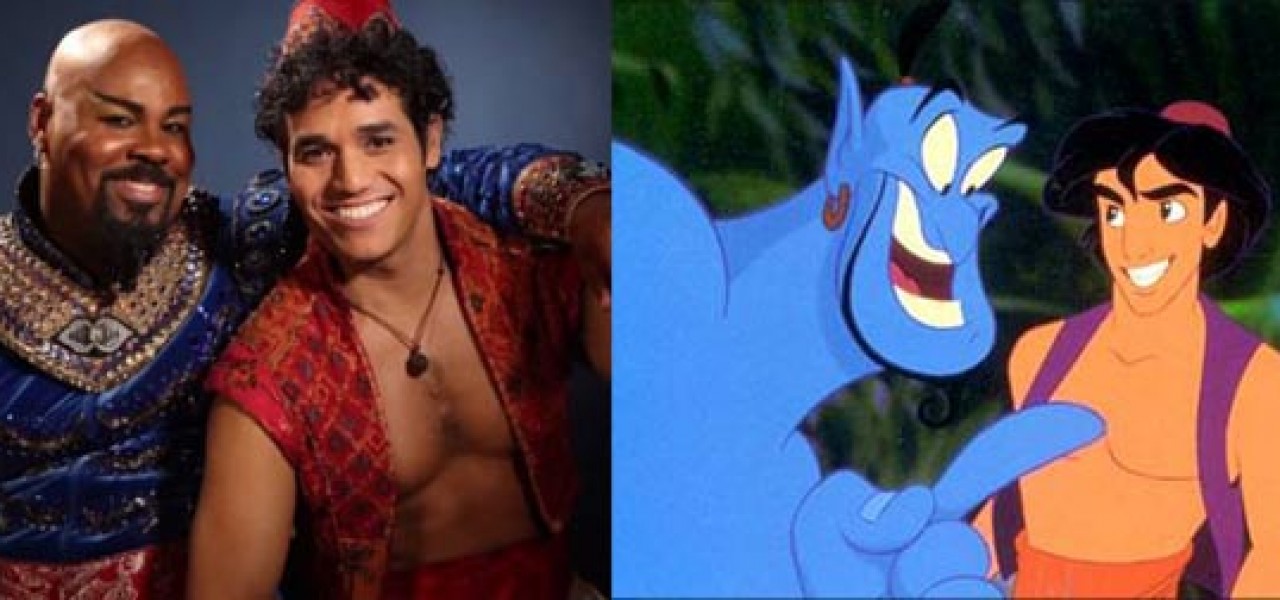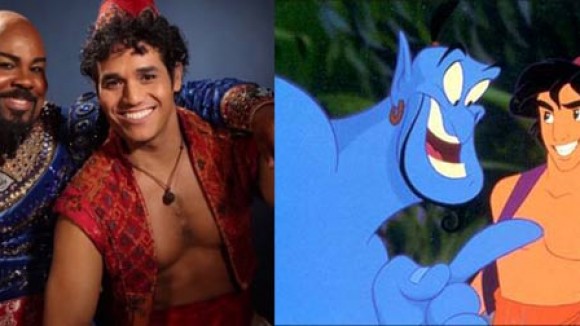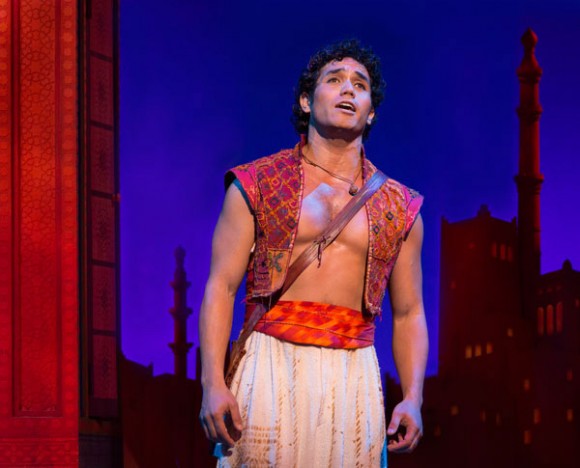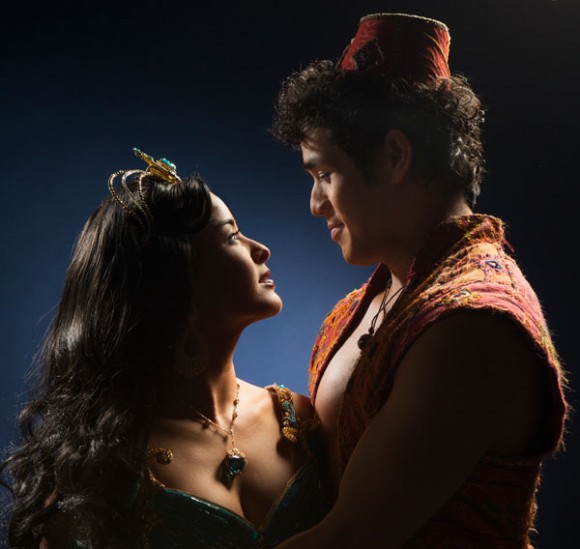

Disney’s ‘Aladdin’: The Broadway Musical vs. The Animated Film

After three years of tryouts and short runs in a total of four different cities, Disney Theatrical’s version of Aladdin finally opened on Broadway March 20th at the New Amsterdam Theatre. It is the fifth Disney animated movie to be adapted for the Broadway stage (Beauty and The Beast, The Lion King, Tarzan and The Little Mermaid precede it) and with The Hunchback of Notre Dame, The Jungle Book, Alice in Wonderland and Frozen in various phases of development, it certainly won’t be the last.
So now that it’s here, how does it compare to the animated Aladdin we all know and love? After seeing the musical a few days ago, here are my observations. (Spoilers ahead.)

Story & Songs
The story is a mash-up of the movie version and an earlier version that songwriters Alan Menken and the late Howard Ashman wrote after working on The Little Mermaid. In their version, Aladdin, much to the chagrin of his mother, is a busker who spends the days singing on street corners with his three layabout buddies Babkak, Omar and Kassim. In the Broadway version, Aladdin and his friends are thieves who are trying to go legit by becoming street performers. While the addition of these characters leaves no room for Abu the monkey, Aladdin’s three friends are one of the most entertaining elements in the musical.
All of the songs from the movie are featured, alongside four new ones written for the stage by Chad Beguelin, and three of the songs cut from the original treatment, “Babkak, Omar, Aladdin, Kassim” (performed above at the 2011 Seattle tryout), “High Adventure,” and “Proud of Your Boy,” a ballad that Aladdin sings to his mother. You may remember the latter as the song from a segment in the deleted scenes of the Waking Sleeping Beauty DVD, where storyman Ed Gombert breaks into tears trying to explain why no one wanted to see it cut from the film. It’s nice to see Aladdin (played by Adam Jacobs) finally get to sing the song to his mother. Unfortunately, he sings it to her in absentia, because she is dead—poor lady just can’t seem to catch a break.

A Genial Genie
The Genie opens the show with the song “Arabian Nights,” but doesn’t return until towards the end of Act One where he kicks, flips, and riffs his way through a show-stopping version of “Friend Like Me.”
In lieu of a shapeshifting cartoon character with the voice of Robin Williams, they put everything into the rapid-fire sass of James Monroe Iglehart, who, with the help of some pyrotechnics, lighting tricks, and sleight of hand, manages to inject much needed energy into the show. Iglehart replaces the celebrity impersonations of the original Genie with pop culture references, self-aware commentary, and other fourth-wall breaking shenanigans. He even joyfully transitions “Friend Like Me” into a medley of popular songs from Little Mermaid, Beauty and the Beast, Lion King and Pocahontas in a soulful style reminiscent of James Brown.

Princess Jasmine
In David Koenig’s book Mouse Under Glass, he recounts that the film’s writers Ted Elliott and Terry Rossio wrote Princess Jasmine in such a heroic and purposeful way that it all had to be cut out because she was overshadowing the lead. This new version of Jasmine (Courtney Reed) could have benefitted from some purpose, since they’ve removed so many elements from her arc—her father being hypnotized, an overprotective tiger, vamping it for Jafar to help Aladdin—that she’s just a stubborn princess who runs away from home. Her most interesting moment is when, during the heat of her frustration with having being forced to marry, she threatens her father with the idea that she can rule Agrabah alone, without a husband.
When you compare the musical’s grand production numbers with Bollywood-influenced choreography and numerous quick changes, even Jasmine’s songs are unimaginative. During “A Whole New World,” Aladdin and Jasmine are hoisted onto a carpet—a non-sentient one—and they float around in front of a humdrum bed of stars and a giant full moon for what feels like ten whole minutes. At one point, the moon turns into the Earth and you’re left to wonder, “Are they… in outer space?”

Better The Devil You Know…
They really could not have gotten a better actor to impersonate the villainous vizier Jafar, because the actor who plays the role, Jonathan Freeman, also voiced the character in the original film twenty-two years ago. Andreas Deja, Jafar’s supervising animator, reportedly designed the look of the original character based on the actor/singer’s bellowing voice before ever meeting him in person. It’s too bad that the voice is all that Jafar has going for him; his scenes do not expand upon his motivations and are often stolen by the scenery-chewing Iago (a human, not a parrot, played by Don Darryl Rivera). Apparently, a version of the Menken/Ashman/Tim Rice song “Why Me?” was originally in the show at some point (below), but it didn’t make it to Broadway. Instead, once Jafar gets a hold of the lamp, he squanders his wishes (“I wish to make Jasmine my slave!”), spits out a reprise to “Prince Ali,” and experiences a comeuppance that is wholly anti-climactic.

.png)